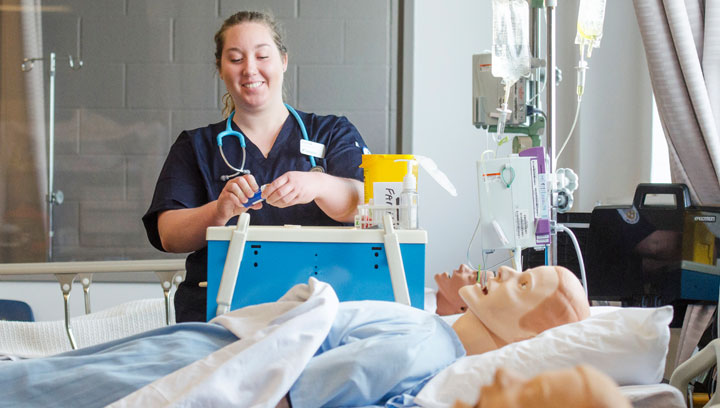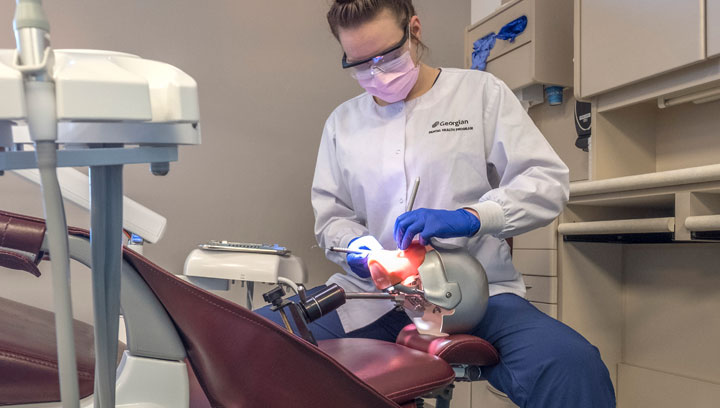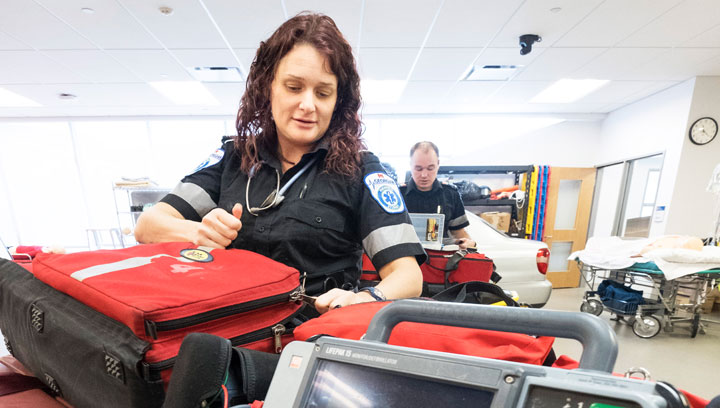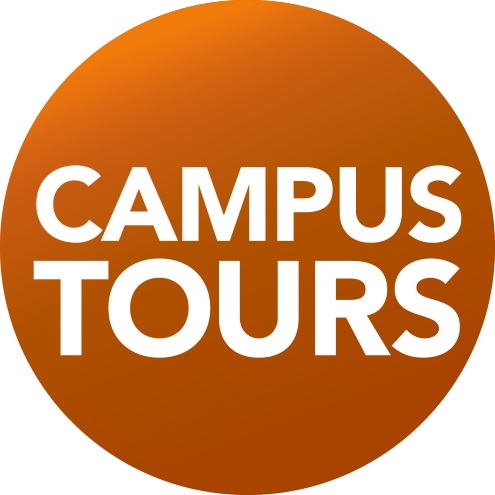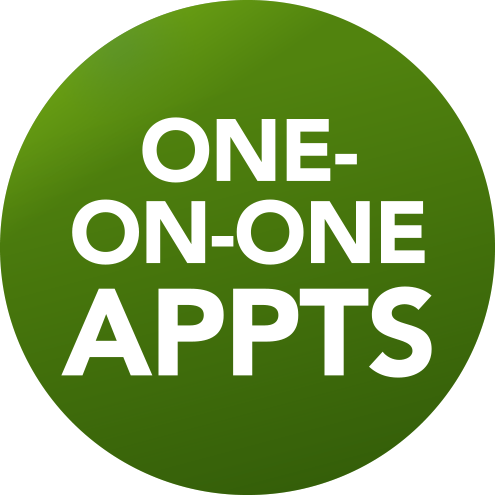
Make a difference with a career in mental health
Mental Health – Interprofessional Practice Ontario College Graduate Certificate program
Support mental health, well-being and recovery. Growing industry with a demand for skilled, compassionate care providers. Four-week clinical placement.
Part-time – online
Program information
Program description
Professionals in the healthcare field recognize that mental disorders, including addictive behaviours, play a prominent role in the many complex clinical presentations which all front-line clinicians face. In this program, students are equipped with the appropriate clinical competencies to recognize and include mental health issues and build effective plans of care, within their current scope of practice, to ensure good clinical outcomes. Students are exposed to a variety of intervention options such as motivational interviewing, cognitive behavioural therapy, acceptance and commitment therapy and dialectal behaviour therapy. Ultimately, students develop the skills necessary to effectively work with clients to deliver enhanced services with a focus on quality across a variety of settings.
Intake information
| Start date | Campus |
|---|---|
| Fall 2025 | Barrie |
Tuition and fees
- Visit our tuition and fees page for detailed information on the cost to attend Georgian.
- You can afford this! Explore OSAP as well as awards, scholarships and bursaries to help you pay your way to graduation.
Work-integrated learning
- This program includes a clinical placement component where you’ll get clinical experience under the supervision of an experienced registered or licensed professional.
- Learn about types of work-integrated learning at Georgian.
What are the admission requirements for the Mental Health – Interprofessional Practice program?
Mental Health – Interprofessional Practice admission requirements
Ontario College Diploma, Ontario College Advanced Diploma, degree or equivalent in a health, education, human services, or community safety-related field. Related fields may include nursing, allied health professions and/or the following:
- Developmental Services Worker
- Social Service Worker
- Honours Bachelor of Counselling Psychology
- Addictions: Treatment and Prevention
- Therapeutic Recreation
- Autism and Behavioural Sciences
- Police Foundations
- Honours Bachelor of Police Studies [BAPA and BAPS]
- Community and Justice Services
- Protection, Security and Investigation
- Medical Administration
Selection Process
Applicants with a diploma or degree in a health-related field, from a private institution, must also present registration designation from the affiliated regulatory body. Applicants may be required to submit a resume and cover letter that includes details of work experience. Proof of employment or other documentation may be requested.
Criminal Reference/Vulnerable Sector Check
Placement agencies require an up-to-date clear criminal reference check and vulnerable sector check prior to going out on placement. Students should obtain their criminal reference three months prior to placement; checks conducted earlier may not be considered current. As some jurisdictions require longer lead-time for processing, please check with the program coordinator to ensure you allow for sufficient turn-around time. It is the student’s responsibility to provide the completed document prior to placement start.
NOTE: Individuals who have been charged or convicted criminally and not pardoned will be prohibited from proceeding to a clinical or work placement.
Additional information
Students attending clinical field placement must have up-to-date immunization records in compliance with the Public Hospitals Act. Students must also have a valid mask fit test and Level HCP CPR and Standard First Aid. Students are to use the Clinical Preparedness Permit to document completion of these clinical requirements.
Completion and submission of this permit is required in order to ensure placement in clinical and field placement facilities.
For the clinical field placement, students will be placed primarily with one of community partners’ facilities, which include a variety of departments and providing different services. Students are required to provide their own transportation to the placement site.
Information about placement requirements
To help you navigate the requirements to complete the clinical placement component(s) of this program (e.g. immunization, First Aid and CPR, criminal record screening and other non-academic requirements), please review the details below.
For more information about placements, visit the Placement Offices webpage.
In order to provide quality practicum placements (“Placements”), students are placed in a variety of agencies, largely in the region serviced by the campus. Students are required to provide their own transportation to Placements. Placements may vary in length (e.g. six to 12 hour days) and may include weekends and evenings, with varying start and end times (e.g. day, afternoon, overnight).
Many programs, including Health and Wellness, have immunization, First Aid and CPR, criminal record screening and other non-academic requirements that need to be met prior to Placements starting. You are responsible for carefully reviewing and meeting these requirements. The failure to meet them may mean that the host agency may refuse to accept you for a Placement or, if you have started one, that you may be prevented from continuing. The result may be that you cannot complete your program. Program-specific requirements can be found on page 2 of the Clinical Preparedness Permit specific to your program.
You are responsible for meeting all immunization, criminal screening and other requirements by the deadline provided by your program and before you start your Placement.
Notes regarding the Criminal Record Check (“CRC”) and Vulnerable Sector Screening (VSS)
Individuals who have been charged or convicted criminally and not yet pardoned or who have adverse entries on their CRC or VSS will be prohibited from proceeding to a Placement. Such a student will normally be counselled to withdraw from the program because the successful completion of a Placement is a program requirement.
Obtaining the CRC and VSS usually requires a processing time of up to 12 weeks and can vary between police jurisdictions. As some jurisdictions require longer lead time for processing, ensure you allow for sufficient turn-around time. Record checks and screenings conducted earlier than six months may not be considered current and not be acceptable. Refer to your Clinical Preparedness Permit for information regarding this. A host agency may refuse a Placement if the CRC or VSS is not satisfactory to it. It is the student’s responsibility to provide the necessary completed documents prior to the start of a Placement at the designated check time, and in the format set by Georgian College and stated in the Clinical Preparedness Permit Information Package. More information can be found on the Placement Offices webpage.
The costs associated with the provision of the CRC and VSS, anything related to them (including, if applicable, obtaining a pardon), and meeting any immunization and other Placement requirements, are to be borne by the student. The non-academic requirements of clinical agencies as described in the Clinical Preparedness Permit are subject to change at any time and host agencies may accept or decline students for any reason at their discretion. Georgian College is not responsible for any of the costs associated with the foregoing, nor for the consequences of failing to comply with, any of the requirements set out above.
What career paths can I take in mental health?
Your Mental Health – Interprofessional Practice graduate certificate gives you many career opportunities
Completion of this program enhances the employability of graduates in the full range of health care professions, adding an important, long neglected, and critical component to their knowledge and skill sets. Graduates who complete this program may find employment in community-based health and social services, hospitals and other agencies providing mental health services.
Flex MORE. Study Mental Health – Interprofessional Practice part-time
Benefits of studying part-time:
What you need to know:
Next steps:
What courses are included in the Mental Health – Interprofessional Practice graduate certificate program?
Course overview
11 Program Courses
1 Experiential Learning Opportunity
Program-specific courses
Semester 1 courses are listed below. For a full list of courses in the program including course descriptions, view the Mental Health – Interprofessional Practice program outline.
- MHCC 1000 – Major Mental Disorders
- MHCC 1001 – Determinants of Health: Mental Health Policy and Practice Perspectives
- MHCC 1002 – Counselling Skills: Building Clinical Competencies
- MHCC 1003 – Trauma and Trauma-Informed Practice
- MHCC 1004 – Working with Diverse Clients
- MHCC 1007 – Issues and Trends in Mental Health Practice
Your course delivery method(s)
Online
This program is delivered online. You’ll learn remotely and won’t be required to come to campus. Online learning can be synchronous – you’ll meet with your professor for online classes at scheduled times – or asynchronous – you’ll complete online learning modules on your own.
Please note, delivery methods are based on planning for the upcoming semester and are subject to change.
Check out our other related programs
Bachelor of Science in Nursing (BSCN) Collaborative Program
Become a future nursing leader recognized for your passion for knowledge, inquiry, human science and social justice.
Dental Hygiene
Top scores in student and employer satisfaction. State-of-the-art learning facilities. Great community connections. Excellent careers!
Paramedic
Preparing students with the knowledge and skills to practise emergency out-of-hospital medical and trauma care. Featuring state-of-the-art learning technology and a nationally-recognized faculty.
Personal Support Worker
Develop your skills during placements. Become an integral part of a health-care team. Graduate job-ready or pursue further studies.
Do you have questions about Mental Health – Interprofessional Practice? Contact us!
Thinking about applying to Georgian?
Contact our student recruitment team to explore your study options.
Already applied to Georgian?
Connect with the Office of the Registrar for admissions-related questions.
Are you an international student?
Contact our international recruitment team to learn more about studying at Georgian.
Ways to connect

Visit us in person at Open House on Saturday, Nov. 16 at all campuses.
Learn more and RSVP
Take a guided, in-person tour
of our campuses.
Book a campus tour.
Book a phone appointment
with a recruitment specialist.
Connect with a recruiter.
Join our email list for event updates, contest information and more.
Sign up for Georgian updates.

